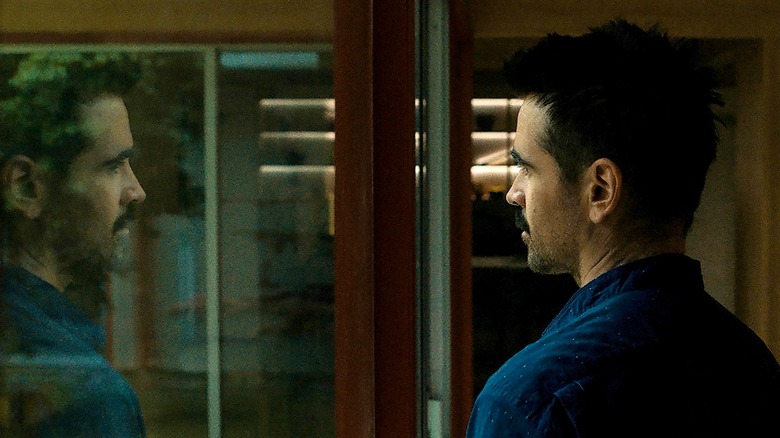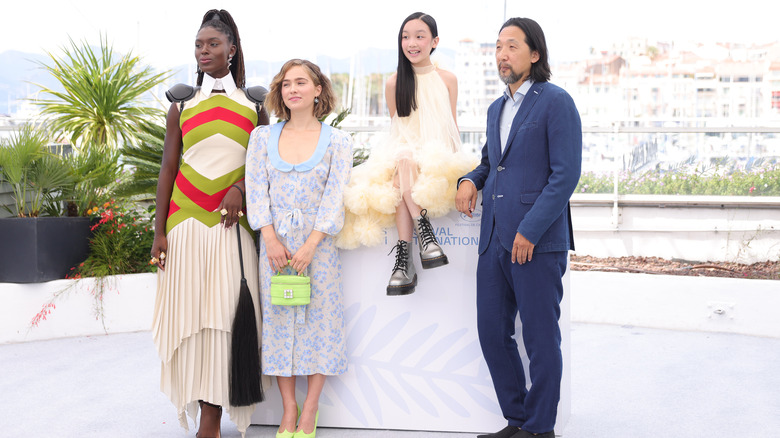After Yang Review: Kogonada's Sci-Fi Sophomore Feature Finds Beauty In The Ordinary [Sundance 2022]
Kogonada's 2017 feature debut, "Columbus," was one of the standout films from that year's Sundance Film Festival, and the director is finally back with his second movie. "After Yang" is a sci-fi story, but it continues Kogonada's cinematic explorations of grief, loss, lineage, and finding beauty in unexpected places.
Sometime in the future, Yang (Justin H. Min) breaks down. He's a quiet, pleasant android (or, in the parlance of this film, a "techno-sapien") who was purchased to serve as a big brother figure to an adopted young girl named Mika (Malea Emma Tjandrawidjaja) and teach her about her Chinese heritage. Despite the fact that his insides are full of motors and wires and she's flesh and blood, the two characters share a deep familial bond. But when Yang spazzes out and can't be rebooted, Mika's parents, Jake (Colin Farrell) and Kyra (Jodie Turner-Smith) begin to wonder if maybe they've been relying a bit too much on Yang and haven't devoted enough of their own time to raising Mika. Yang's absence throws off the family's dynamic and highlights fractures that may have previously lain dormant. He spends much of this movie sprawled out on a slab, but he exhibits so much life throughout several flashback scenes that you understand why these people miss him so much.
Mika doesn't want to see Yang get recycled, so even though he was purchased as a refurbished model and his warranty is likely expired, Jake goes on a quest to see if someone can fix him. He eventually visits a museum for artificial intelligence, where a curator named Cleo (Sarita Choudhury) hooks Jake up with the technology to be able to access Yang's memory banks, where the android has recorded brief snippets of video for every day of his existence. Jake finds himself deeply moved while sifting through the memories, learning more about this extraordinary being he's taken for granted and discovering the little moments Yang valued that the rest of us often overlook, like the way light falls in a specific room at a certain time of day. He also discovers a woman (Haley Lu Richardson) who appears in many of Yang's memories, and her presence there fuels a mystery in the back half of the movie as Jake learns more about how she and Yang were connected.
Kogonada Does It Again
Kogonada once again utilizes striking set design to fill out his world, using geometric shapes, stacked boxes, and asymmetrical lines to add warmth and definition to the family's open floor plan. He also uses meticulous composition and deliberate blocking to enhance the characters and their journeys; in one deep focus shot that takes place in a dimly lit, backroom chop shop, Jake steps from the farthest reaches of the frame into darkness in the foreground as he tacitly agrees to continue down the path he's on. It's Directing 101, but Kogonada's attention to detail helps make every choice feel both purposeful and meaningful.
While "Columbus" could occasionally feel a bit detached, "After Yang" sometimes walks right up to the edge of cliche. The exploration of Yang's memories looks like a compilation from the 1 Second Everyday app, and while the montage is supposed to be profound, it feels like it's always a split-second away from cutting to a hand slowly waving its way through a wheat field. Then again, when moments like this are done well, they make me feel like there can never be too many movies that extol the virtues of stopping to smell the roses. Example: After seeing Yang's appreciation for the small things in life, Jake steps outside into a light rain, closes his eyes, and lifts his face to the sky. This isn't Andy Dufresne breaking out of Shawshank: Colin Farrell underplays it, and by doing so, he sells it as a genuine, truthful moment of grace for his character.
An effective blend of lyrical impressionism and controlled precision, "After Yang" is another quietly impressive effort from Kogonada. (Note: If none of that made you want to see the movie, may I interest you in Colin Farrell doing a Werner Herzog impression? Because that also happens here, and it's great.)
/Film Review: 8.5 out of 10

